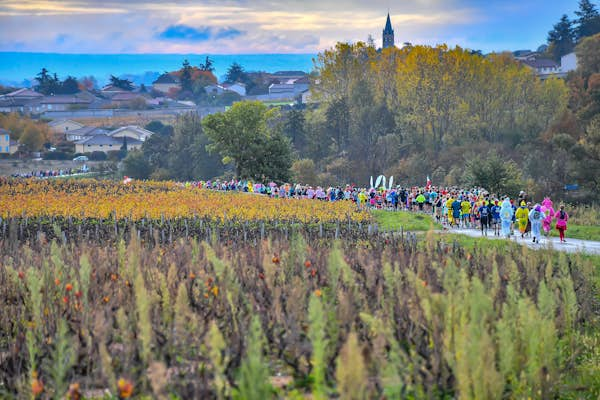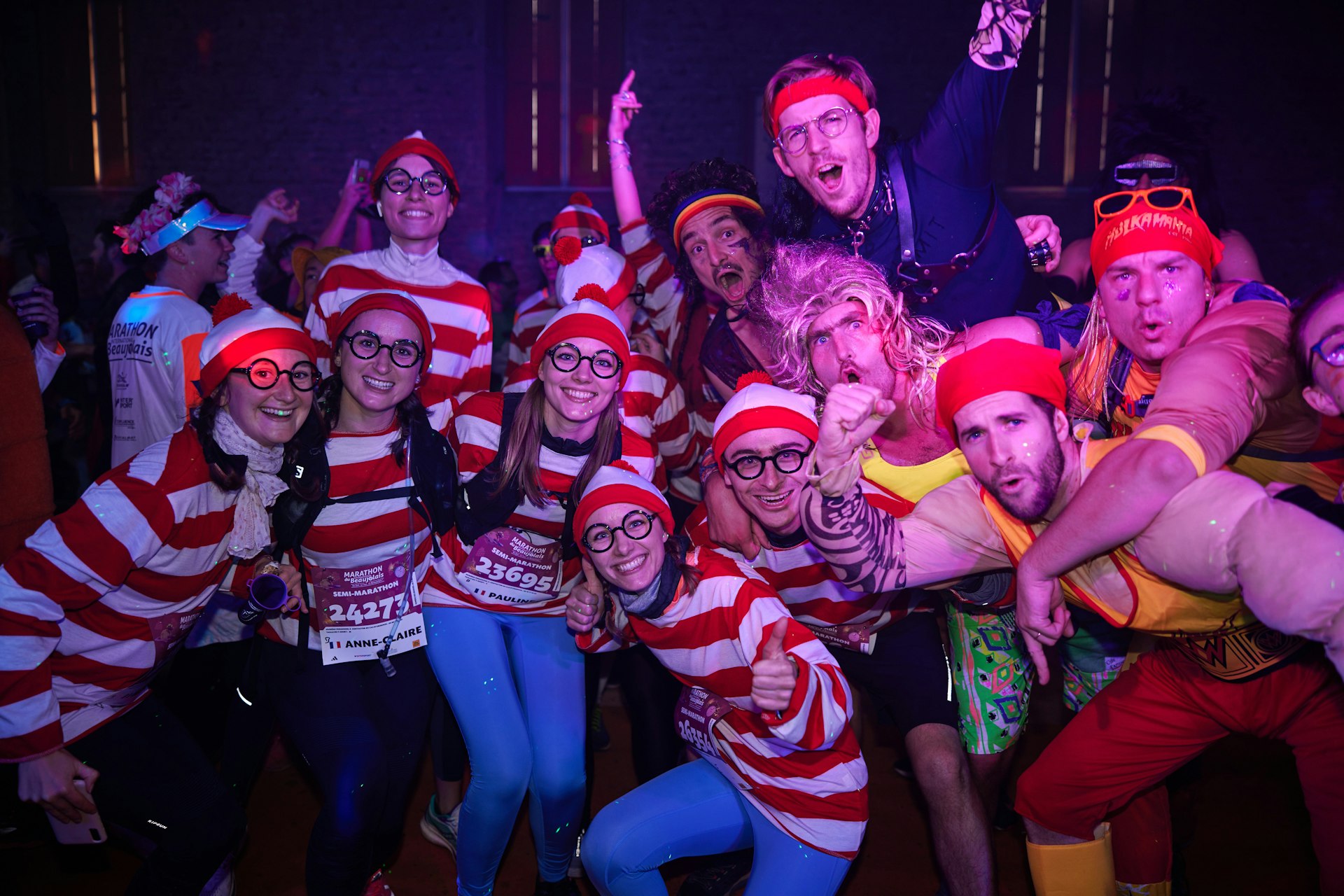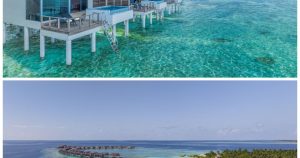
How do you make a marathon fun? Add wine. Lyon-based writer, wine aficionado and runner (in that order) Anna Richards argues that the best wine marathon in France takes place in Beaujolais.
These days, bar crawls have gotten a whole lot more physical.
The world’s first wine marathon, the Marathon du Médoc (near Bordeaux), started in 1985, and since then, wine-infused runs have popped up all over the globe. Rather than jelly candies and gel sachets, runners participating in Médoc are treated to oysters and ice cream (France is the country of haute cuisine, after all). Yet securing much-coveted places has become an almost military operation, akin to getting Glastonbury tickets.
Get the inside scoop on the latest cultural happenings all over the world delivered weekly to your inbox with our email newsletter.
Giving Médoc some worthy competition is the Marathon du Beaujolais, in eastern France. I participated in the Beaujolais Half Marathon in November – and it truly gives Médoc a run for its money.
 All ages are welcome at the wine marathons © Morgan Bove
All ages are welcome at the wine marathons © Morgan Bove
You may have heard of Marathon du Médoc
A carnivalesque parade of gaudily dressed runners, live music and 23 different wine tastings as the region’s famous chateaux open their grounds and cellars to runners along the route. There are also stalls handing out local delicacies like oysters and entrecôte steak, to ham, cheese and fruit. Médoc is a spectacular event indeed. But as the best-known wine marathon in the world, and with participation capped at 8000, the final wave of tickets is already close to selling out. And since the marathon takes place annually at the end of the summer (in 2023, on September 2), hotels and transport are at a premium, and temperatures regularly in the 80s Fahrenheit (high 20s Celsius).
 The Beaujolais marathon is a scenic race through France’s wine country © Morgan Bove
The Beaujolais marathon is a scenic race through France’s wine country © Morgan Bove
You can expect your marathon photos to be framed by blue skies, and to have merlot pouring out of your pores. The Médoc race course is a scenic loop of châteaux and vineyards, and fortunately pretty flat. Yet Beaujolais is linear (starting in the picture-perfect village of Fleurie and ending in Villefranche-sur-Saône), and takes you largely downhill. Médoc will run you €96 for a basic race pack, compared to €65 for Beaujolais. While this sounds like a lot for a mere run, it works out good value once you factor in all the included tastings and food. For both, participants receive a party bag that includes a bottle of wine. (Chugging it during the warm-up is not recommended.)
 Participants of the Marathon du Médoc are treated to oysters © Philippe Lopez / AFP / Getty Images
Participants of the Marathon du Médoc are treated to oysters © Philippe Lopez / AFP / Getty Images
But have you heard of Marathon du Beaujolais?
Beaujolais is a region for people who like to enjoy wine without pretense. Many of the crus (prestigious vineyards) win plenty of awards, yet this doesn’t stop winemakers from having some fun with it.
Beaujolais Nouveau has gone viral around the world. Once regarded as a clever PR stunt, the tradition started in the 1970s, when local winemaker Georges Duboeuf arrived in New York to flog a crate of young wine from that year’s harvest. Today, celebrations happen worldwide everywhere from San Francisco to London each November, with particularly large festivities happening in Japan (people quite literally bathe in the red stuff). Nowhere is the party quite as raucous, though, as in Beaujolais itself, the crowning event of which is the Marathon du Beaujolais.
The route winds through 12 villages, with 15 tastings along the way. If 26.2 miles has you running in the other direction, there’s an eight-mile route with three tastings, or the 13.1 mile half marathon route, which I opted for, officially with nine different tasting stops (though the final pitstop has 10 tasting stands in a row).
 Fancy dress is encouraged © Morgan Bove
Fancy dress is encouraged © Morgan Bove
Arguably as important as the free-flowing wine is the fancy dress. Unless you’re Mo Farah, wearing Lycra makes you look silly (this isn’t a marathon to set a personal best). Think “wow” factor over practicality: supermarket trolleys, cardboard locomotives and pantomime horses. The best getup I saw was the late Queen Elizabeth II, who somehow managed to run with a bottle of Beaujolais balanced on a silver tea tray surrounded by Rich Tea biscuits.
The first couple of tastings risk running dry, particularly if you’re in the last wave of runners – but don’t despair. The further along you get, the more refreshments materialize, and many stands hand out full bottles rather than simply refilling your souvenir cup. The route dives in and out of wine cellars, with live music and DJ sets, while wine barrels on wheels provide either a twirling podium or a fast track to a broken ankle, depending on inebriation levels.
 Writer Anna Richards and friends at the Beaujolais Wine Marathon in November 2022 © Anna Richards
Writer Anna Richards and friends at the Beaujolais Wine Marathon in November 2022 © Anna Richards
Since the event takes place in November, temperatures are much cooler than for Médoc, and the vineyards serve up a fiery mass of crimson and burnt-orange vines. The Beaujolais villages along the route are built from the region’s golden stone, which becomes positively luminous in sunlight.
 The views and scenery along the Beaujolais route are hard to beat © Morgan Bove
The views and scenery along the Beaujolais route are hard to beat © Morgan Bove
Regardless of length, all the routes finish in the region’s 13th-century capital, Villefranche-sur-Saône, and follow mostly fully paved country roads, with some muddy sections cutting through the vineyards. Officially there’s a time limit (seven hours for the marathon, four hours for the half), but since the people of Beaujolais aren’t known for their punctuality, it wasn’t strictly enforced when I ran. In 2022, over 20,000 runners participated, which created an unparalleled party atmosphere.
Is it France if I don’t mention food? While there are oysters (you’re a long way from the sea), you can expect delicately grilled morsels of rare steak, Comté cheese and chocolate galore.
 At both marathons, local chateaux and vineyards open their cellars and bars for participants to enjoy a glass (or two or three) of wine © Morgan Bove
At both marathons, local chateaux and vineyards open their cellars and bars for participants to enjoy a glass (or two or three) of wine © Morgan Bove
How to make it happen
Sign-ups for Marathon du Beaujolais are now open. Race packs need to be collected in person (or by a friend with a photo of your ID) one to two days before the marathon. All runs in France require you to have a signed doctor’s note to say you’re fit enough to participate. Forms can be downloaded here and are valid for a year.
 The Beaujolais afterparty is an easy-going and welcoming celebration © Morgan Bove
The Beaujolais afterparty is an easy-going and welcoming celebration © Morgan Bove
Accommodation in Villefranche-sur-Saône is limited, but Lyon (30 minutes by train) has many lodging options, plus countless Beaujolais Nouveau parties to continue the euphoria post-run. High-speed trains to Lyon take two hours from Paris; you can also fly in to Lyon–Saint-Exupéry airport.



